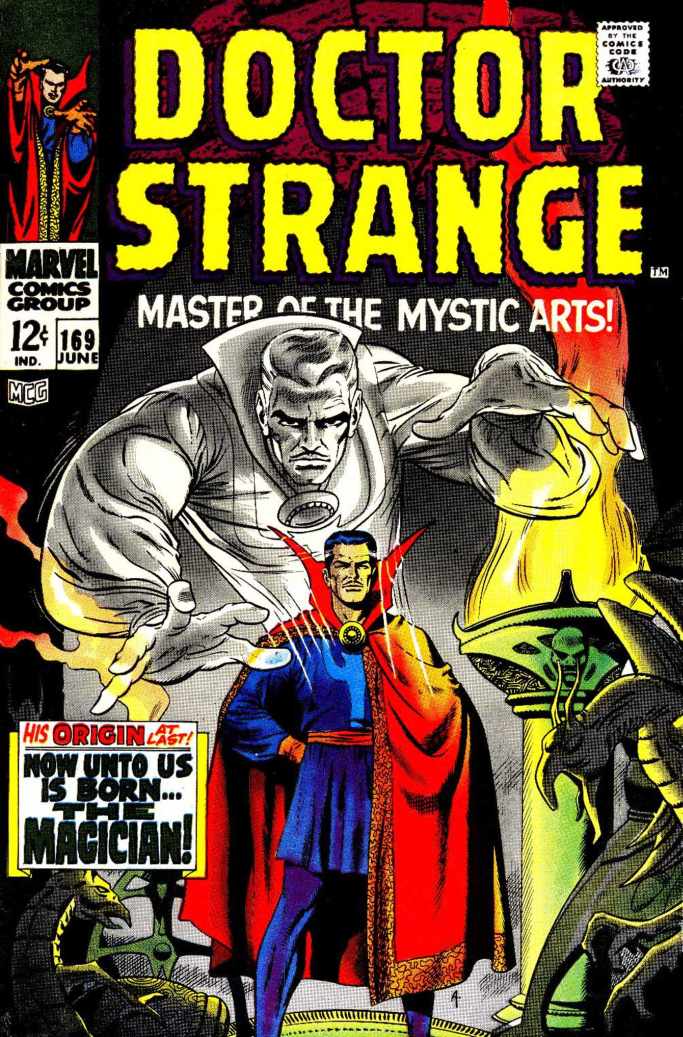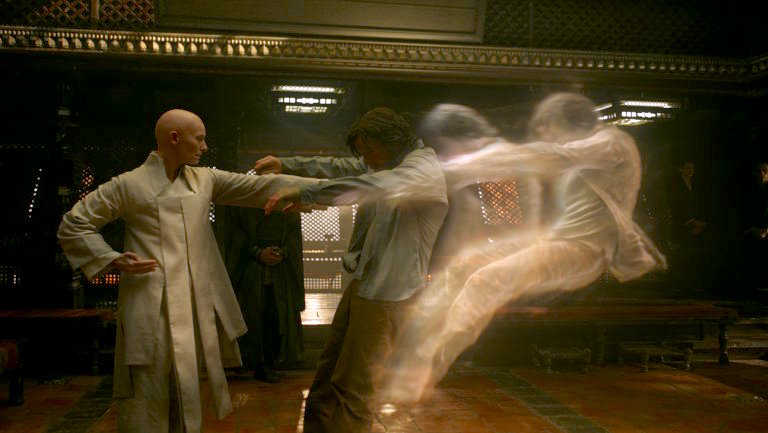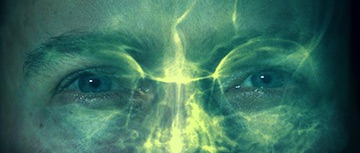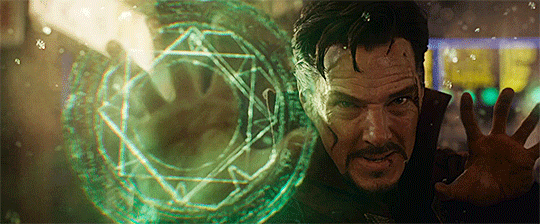Doctor Strange and the Comic Book Movie Dilemma
 Sunday, November 27, 2016 at 9:45AM
Sunday, November 27, 2016 at 9:45AM by Deborah Lipp
 I have a pet peeve about comic book movies, and Professor Spouse is sick of hearing it, so I’m imposing on you all. When Professor Spouse and I got back from seeing Dr. Strange, I said, “I have one* complaint—it’s an origin story.” She said, “I knew you would say that.”
I have a pet peeve about comic book movies, and Professor Spouse is sick of hearing it, so I’m imposing on you all. When Professor Spouse and I got back from seeing Dr. Strange, I said, “I have one* complaint—it’s an origin story.” She said, “I knew you would say that.”
*Well, only one complaint that is the subject of this essay.
The fundamental problem in comic book movies is the shift into a different medium, though in many ways the mediums are a natural fit...
Unlike the book-to-movie journey, comics don’t have to be fundamentally changed to make them visual—they’re already visual; movie storyboards are already practically comics. Visual effects can be far more spectacular on film if they’re pulled off well (which Dr. Strange certainly brought to fruition). While movies can create great visual effects, it’s television that shares with comic books the idea of serialization. A comic is a continuing story with both long story arcs and one-off adventures. In that sense, it’s a TV show on the page. All of these conflicts and compatibilities are made clear in the problem of the origin story...

Dr. Strange does what virtually every superhero movie does—it relates the familiar tale of the hero’s origin. Peter Parker, high school science nerd, gets bitten by a radioactive spider. Tony Stark invents an iron suit that keeps his defective heart from killing him. Thor leaves Asgard for Earth. Jor-El sends his only son away from Krypton before it explodes.
And then what? Films tell these stories well, but they tend, thereafter, to fall apart. You can get a second movie out of a superhero—often a better one—but overall, it’s the third movie where it all goes haywire. I give you Spider-Man 3. I give you X-Men 3. I give you, moreover, abortive franchises like Fantastic Four, which just keep telling the damn origin over and over again.
Origins have a defined set of work to do: Introduce a character by hitting familiar beats for fans while being accessible to newbies, and deconstruct/modernize a well-known story. Subsequent movies have to tell a new story, which has to again engage newbies as well as people who saw the previous film, and reintroduce the character without retelling the whole origin.

Comics are great at this. An issue of Spiderman might tell the tale of the radioactive spider, or Uncle Ben’s tragic death, in no more than four panels and then move on. Professor Spouse admires the relatively unloved The Incredible Hulk (2008), because it dispenses with the entire origin story during the opening credits. It moved on.
The problem with Dr. Strange is that of any superhero origin movie. You invest energy into this new character, but have, truly, no idea if you’ll be rewarded by subsequent films. A comic book origin story is a strong indicator of what that book will be like each month, but a good origin movie gives only the barest indication of what #2 will be. When I go to see Arrival or Sully, I don’t need a subsequent film, but a superhero movie is building scaffolding for a franchise, it’s Chapter One. When Chapter One is always “how it all began”, it’s both too predictable, and too unlikely to give a meaningful sense of the rest of the book.
Television is taking this whole thing in a different direction—a direction often taken by comic books as well. Jessica Jones and Luke Cage tease out pieces of the hero’s origin throughout their premiere seasons. They start with a compelling situation—characters, villains, allies—and the hero is someone we are interested in, not because of an origin story, but because he or she is interesting.
So here’s Dr. Strange, with an origin that hits familiar beats for those who’ve read his comics. The arrogant surgeon, the quest for healing, the Ancient One, the Sanctum Sanctorum. A good story, a great cast, beautiful visuals. But do we know yet if we will love this franchise?
We do not.

 Adaptations,
Adaptations,  Doctor Strange,
Doctor Strange,  Marvel,
Marvel,  TV,
TV,  Visual FX,
Visual FX,  comic books,
comic books,  sequels,
sequels,  superheroes
superheroes 


Reader Comments (7)
I so agree 100%. The origin story in the Marvel TV series are much better handled but even then they tend to kill the narrative when they arrive with full force. Why can't we just jump into stories en media res. I don't think Star Wars would have become half the phenomenon it was instantly if we had started with Luke & Leia's origins. Instead we're right in the intergalactic battle with backstory imagined.
To me that's always preferrable. I don't understand the modern obsession with back story. It only seemed to truly take over in the Late Nineties / Aughts and now it just never lets up with explanations.
Curiously, Doctor Strange is one of the few Marvel heroes whose origin wasn't told in the original comics until he'd been around for several issues already.
Speaking as a horror movie fan, I totally back Nathaniel's comment on back story. Several years ago, when they started remaking classics from the 70's like The Texas Chainsaw Massacre and Black Christmas, they always felt the need to (over) explain every damn little thing that the original movies effectively left to the imagination. This sucked the mystery and suspense out of the remakes. Telling the superhero origin stories in shorthand (as in 2008's The Hulk) is def the way to go -- esp. when doing a reboot.
Rob I agree with you a 100%- horror movies do need an element of mystery- Michael Myers from Carpenter's original classic is more terrifying than the over explained character from the Rob Zombie remake- in horror sometimes less is more effective.
Marvel superheroes all seem to have a similar story line which seems inspired from 1950s sci fi an experiment goes wrong and instead of a monster we get a Spider Man or a Hulk or the Fantastic Four.
Very well put, Deborah.
Deborah: I'd somewhat say it depends on the hero, and whether the loose concept of the origin adds something to the genre. Most, probably shouldn't dwell. Even on a TV level, my top 3 Superhero shows (whether taken from a comic character or not) are 1. Batman: The Animated Series. (Origin only (touched on) once in the first episode. Robin I and, basically, Robin 2 (There's a reason the BTAS character is nicknamed Timmy Todd) origins given a total of 3 episodes.) 2. Danny "The Best Spider-Man Show Ever Made" (The best "official" Spider-Man show is probably Spectacular, and, though a little better ANIMATED than Danny Phantom, it also had NO sense of episode craft, since every episode nakedly contorted itself to set up four-six OTHER episodes it ALSO wanted to get to) Phantom (Everything you NEED to know, origin wise, is in the theme song. Detailed origin (and cool new logo) at 21st episode.) 3. Teen Titans (Team origin at (!) 62 episodes. Of the solo origins, only Raven's gets THAT MUCH detail, and that's only because it's the driving force of an entire season.)
Volvagia, good summary! I think Batman's origin always hovers over him, in any serious depiction (60's Adam West excepted) because it informs his every move.
We can kind of divide origins into "how I got my powers" and "what motivates me". Batman didn't get powers, so it's always motivation, motivation, motivation. Dr. Strange's entire backstory has no real motivation--he has the power so he uses it.
Most heroes, though, fall somewhere in the middle. Daredevil and Spiderman whose powers are acquired pretty much by accident, don't need those stories retold. It's the motivations that earn periodic revisits -- Uncle Ben and Battling Jack Murdoch.
I absolutely love the scene in Jessica Jones when she and Luke first talk about powers. "Accident. Yours?" "Experiment." Badabing, badaboom.